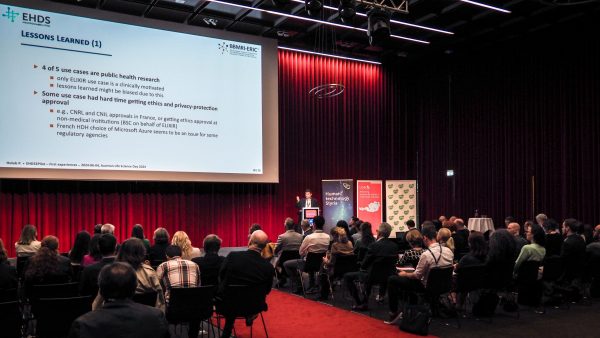I am looking for information as
Researcher

Industry

Patient

BBMRI-ERIC presents at 2nd Austrian Life Science Day: Health Care Data Graz
This article is 407 words and an approximate two-minute read.
On June 4th, 2024, the second “Austrian Life Science Day: Health Care Data Graz” welcomed participants from different health-related fields to the auditorium of the Med Uni Graz. BBMRI-ERIC Austria and Headquarter’s leadership were there to present.
Linking academia and industry
Brought together by the aim to develop future-oriented ideas in the health sector, more than 150 researchers, health care providers and business representatives discussed challenges and best-practice examples of patient data-driven medical research.
Primarily organised by Human.technology Styria and the FFG, the event provided talks, panel discussions and business-to-business sessions spotlighting leading national projects and international flagship models.
BBMRI-ERIC presents EHDS2 and Health Data Hubs
The presentations included a talk by BBMRI-ERIC`s Chief Information Officer Peter Holub who emphasised the innovative role of the European Health Data Space (EHDS) in data sharing for research and policymaking. The presentation examined data coverage, anticipation of technological implementations (including the DCAT AP for robust data documentation) and advanced access management systems in the EDHS2 initiative. Speaking about the strategic importance of representing BBMRI at the conference, Petr Holub said:
“The event brought together researchers from academia and industry to explore closer collaboration for health and life science innovation. As this is one of BBMRI’s priorities, especially around the sustainability of biobanks and the mobilisation of data, it was an ideal setting to exchange future-oriented ideas.”
BBMRI.at Director Georg Göbel elaborated on Health Data Hubs for an improved secondary usage of health data jointly created by the Medical Universities of Graz, Vienna, Innsbruck and the Medical faculty of Linz – all of them are part of BBMRI.at, the National Node of BBMRI-ERIC. In the context of international cooperation and regulations, he discussed current approaches and their challenges. Georg Göbel summarises the impact of this event as follows:
“The front-running role of BBMRI as competence centre for research-oriented health data management motivates the Austrian scientific community to engage in closer cooperation towards EHDS-oriented data structures. The event also aimed to foster health data related cooperation between academia and industry in the Austrian context.”
Collaborative Austrian support
Underscoring the collaborative character of this event, it was supported by the aws programme LISA, LISAvienna, the MTC Medical Technology Cluster and the Cluster Life Sciences Tirol. Bringing together stakeholders from these different fields of expertise drives joint efforts to effectively utilise health data as invaluable resource for research and the development of new treatments.






